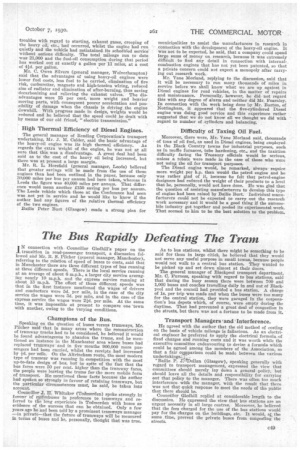The Bus Rapidly Defeating The Tram
Page 71

If you've noticed an error in this article please click here to report it so we can fix it.
.1... iNT connection with Councillor Gledhill's paper on the
transition in road-passenger transport, a discussion followed and Mr. R. S. Filcher (general manager, Manchester), referring to the relation of speed of buses to costs, said that in Manchester there are three different types of bus running at three different speeds. There is the local service running at an average of about 6 m.p.h., a larger city service averaging nearly 10 m.p.h. and the express service running at about 13 m.p.h. The effect of these different speeds was that in the first instance mentioned the wages of drivers and conductors were 5d. per mile, in the ease of the city service the wages were 3d. per mile, and in the case of the express service the wages were 21d. per mile. At the same time, it was impossible at present to compare one 'town with another, owing to the varying conditions.
Champions of the Buis.
Speaking on the question of buses versus tramways, Mr. Filcher said• that in many areas where the reconstruction of tramway tracks had to be considered, he believed it would be found advantageous to abandon the trams, and he mentioned an instance in the Manchester area where buses had replaced tramways and in five' months 900,000 more passengers had been carried, whilst the receipts had increased by id. per mile. On the Altrinchara route, the most modern type of tramcar was running in competition with the most up-to-date design of bus, but in spite of the fact that the bus fares were 50 per cent. higher thanthe tramway fares, the people were leaving the trams for the more mobile form of transport. Ile mentioned these facts. because the author had spoken so strongly in favour of retaining tramways, but the particular circumstances mast, he said, be taken into account.
Couneillor J U. Whitaker (Todmorden) spoke strongly in favour of motorbuses in preference to tramways and referred to the long experience in Todmorden with buses as evidence of the success that can be obtained. Only a few years ago he had been told by a prominent tramways manager —in private—that the future of tramways will be measured in terms of buses and he, personally, thought that was true.
As to bus stations, whilst there might be something to be said for them in large citieh, he believed that they would not serve any useful purpose in small towns, becausepeople would not walk to a central bus station. They wanted to be picked up and set down almost at their doors.
The general manager of Blackpool transport department, Mr. C. Furness, speaking with regard to bus stations, said that during the busy season there were between 700 and 1,000 buses and coaches travelling daily in and out of Blackpool and the council had provided a bus station. A charge of Is. per trip was made and when the buses were too many for the central station, they were garaged in the corporation's bus depots which, of course, were empty during the daytime. That had prevented a great deal of congestion in the streets, but there was not a fortune to be made from it.
Transport Managers anti. 'Interference.
He agreed with the author that the old method of costing on the basis of vehicle mileage is fallacious. As an electrical engineer he preferred to apply the electrical formula,of fixed charges and running costs and it was worth while the exeeutive committee endeavouring to devise a formula which could be agreed among the members of the Association, so that a fair comparison could be made between the various undertakings...„
• Bailie P. J.,7Dollan (Glasgow), speaking generally with regard to transport management, expressed the view that committees should merely lay down a general policy, but should leave all the details and responsibility for carrying out that policy to the manager. There was often too much interference with the manager, with the result that there was not that quick response to meet the needs of the public that there should be.
Councillor Gledhill replied at considerable length to the discussion. He expressed the view that bus stations are an urgent necessity in all large centres. Moreover, he believed that the fees charged for the use of the bus stations would pay for the charges on the buildings, etc. It would, al, the same time, prevent the private buses from congesting the streets.












































































































